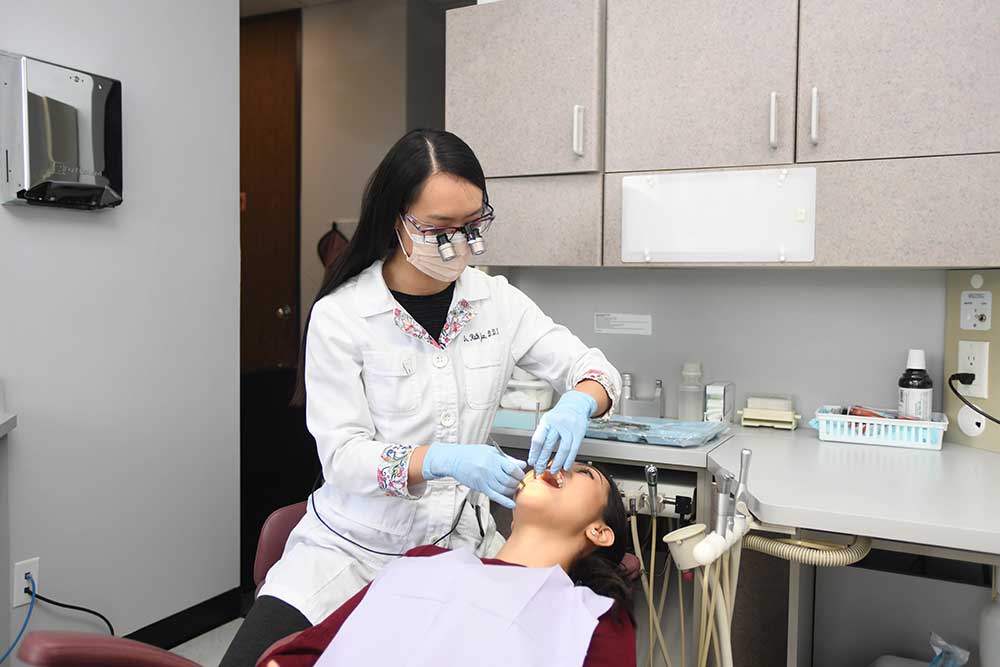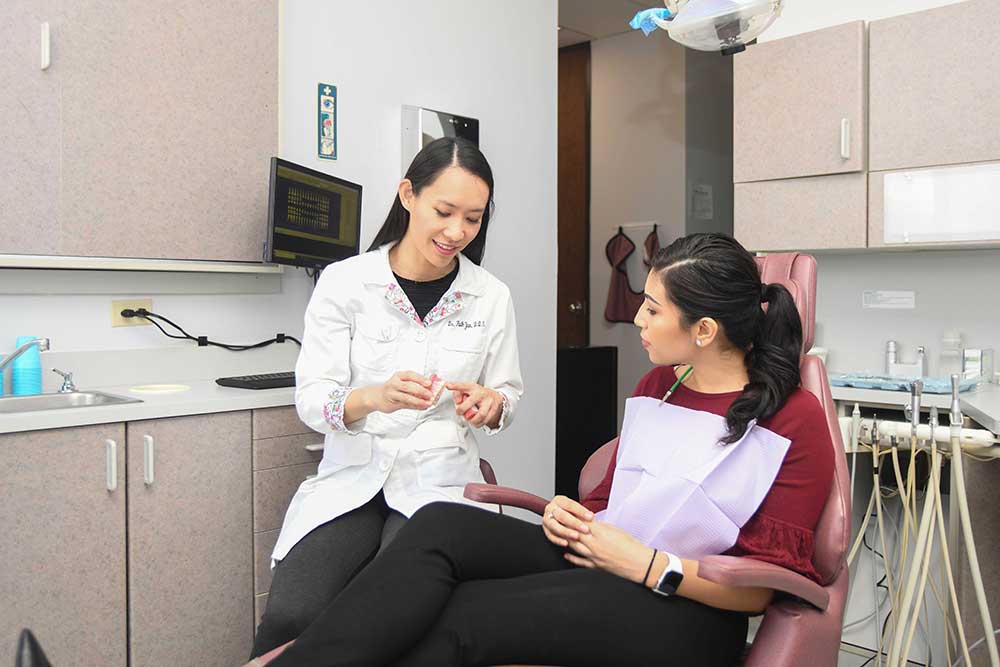In This Article
Gum Surgery | Nottingham Dental
Gum surgery may be performed for two reasons — periodontal treatment or cosmetic surgery for receding gums. Nottingham Dental is one of the best dental clinics in Katy, TX, for gum surgery.

Are you unhappy with your smile? Let us help you achieve your dream smile. Book your gum surgery appointment today!

Gum surgery may be performed for two reasons — periodontal treatment or cosmetic surgery. At Nottingham Dental, we provide laser gum surgery for medical and cosmetic reasons. However, there’s a lot you need to know about gum surgery. In this article, we discuss the types of gum surgery, cosmetic gum surgery for receding gums, and so much more.
Gum surgery is one of the best ways to treat a gummy smile. Book your appointment online today!
Reasons for Gum Surgery
Medical Gum Surgery for Periodontal Disease
Periodontal gum surgery may be necessary to treat gum diseases, such as gingivitis and periodontitis. The primary goal of gum surgery or gum graft surgery is to facilitate the regrowth of damaged bones and tissues, prevent tooth loss, reduce the gap between your gums and teeth, and reshape your jaws and gums after the bacterial infection.
These are several different types of periodontal gum surgery.
- Flap Surgery: This is a gum surgery in which the dentist lifts the flap of your gums to remove tartar and plaque accumulated under your gums. Once the tartar is removed, the dentist stitches the gums back in place.
- Bone Graft Surgery: The dentist may use bone grafts from other sources to help regenerate some of the lost bone structure around your gums and teeth, which will also help with gum regeneration.
- Gum Graft Surgery: You may need gum graft surgery if you have a lowered gum line due to gum recession or bacterial infection. During this procedure, the dentist may use gum grafts or tissues from other parts of your body and plant them in your gums to facilitate gum regeneration.
Cosmetic Gum Surgery for Receding Gums
Cosmetic gum surgery, also known as gum reshaping or gum reduction surgery, is a part of cosmetic dentistry. Most people opt for cosmetic gum surgery to improve the appearance of their smile. Some people have misshapen gums or excess gum tissues, resulting in a gummy smile. Cosmetic gum surgery includes procedures like crown lengthening and pocket reduction to provide a proportionate set of gums.
- Gum Graft Surgery: You may need gum graft surgery if you have a lowered gum line due to gum recession or bacterial infection. During this procedure, the dentist may use gum grafts or tissues from other parts of your body and plant them in your gums to facilitate gum regeneration.
Book your consultation today and speak to our highly skilled dentist to see if gum surgery is the best option for you!
Gum Cutting Surgery Procedure
The entire gum surgery procedure varies depending on what you need. However, most gum cutting surgeries take approximately two hours to complete. In some cases, the individual needing gum surgery may be put to sleep using general anesthesia or local anesthesia.
During the cosmetic gum surgery, the dentist will make incisions along the gums and lift them away from the teeth. If you have insufficient gum or bone tissues, the dentist may use gum grafts or bone grafts from other parts of your body to aid in gum regeneration. If you have periodontal damage, the dentist may clean the tartar and deposits from under your gum tissues.
After the gum surgery, the dentist will stitch your gums using fine threads. The dentist will remove the threads after about a week. Following that, the dentist will provide some after-care tips, such as eating soft food, not smoking, avoiding rigorous exercises, and using antiseptic mouthwash to rinse your mouth after meals.
Benefits of Laser Gum Surgery
Laser gum surgery is one of the latest methods of performing gum surgery. Traditional gum surgery is done using a scalpel, through fine incisions made on the gums. However, our dental clinic also provides laser gum surgery in which the dentist uses laser technology to eliminate gum disease and encourage gum regeneration. The following are the benefits of laser gum surgery:
- Laser gum surgery is minimally invasive, compared to traditional gum surgery, because the dentist doesn’t need to create incisions on your gums.
- Laser gum surgery has a lower risk of side effects and trauma after the procedure. As such, you have a lower risk of suffering from swelling, soreness, sensitivity, etc.
- Laser gum surgery increases the rate of gum regeneration by over 85%.
- You heal from laser gum surgery a lot faster than traditional gum surgery, allowing you to resume most of your regular activities and eating habits.
- Laser gum surgery is more capable of removing deep pockets between gums and teeth, which leads to firmer teeth.
- Laser gum surgery can treat the underlying bone structure without having to lift the gum tissues or flaps, i.e., without gum flap surgery.
- Laser gum surgery doesn’t necessitate stitches, and there’s little to no risk of postoperative bleeding.
Are you searching for gum removal surgery near me? Gum removal surgery is one of the many options you have to fix an unwanted gummy smile! Call us to learn more.
Average Cost of Gum Surgery
The cost of gum surgery can vary greatly, ranging from $500 to over $10,000. The cost of gum surgery depends on several factors — whether you need periodontal gum surgery or cosmetic surgery, whether you need gum graft surgery and bone graft material, and many other factors. Discuss the cost of gum surgery and gum contouring with your doctor. Please note that insurance coverage won’t be available for cosmetic gum contouring, but you may get insurance coverage for medically necessary gum surgery
Are you interested in gum reduction surgery? Call us today and learn more about your options!
Gum Surgery Q&A
What can cosmetic gum surgery do for me?
Cosmetic gum surgery can lead to healthier and more aesthetic gum tissues and teeth. It restores the natural appearance of your teeth, with the perfect proportion of visible gums and teeth, improving your overall smile and appearance.
What can I expect after cosmetic gum surgery?
The amount of pain you experience after cosmetic gum surgery depends on the type of gum surgery, the type of method used, and the amount of incised gum tissues. Laser gum surgery, in general, causes minimal postoperative pain and discomfort. However, you can resume most of your daily activities after your gum surgery, though you may have some sensitivity and soreness.
How do I know if cosmetic gum surgery is necessary for my situation?
Cosmetic gum surgery, as the name suggests, is purely aesthetic. As such, cosmetic gum surgery is never “necessary” — you can seek cosmetic gum surgery if you have a gummy smile or if you want to generally improve your gum’s appearance. However, if you have receding gums, you may also have periodontal disease, which may necessitate gum surgery for medical purposes.
What should I expect during laser gum surgery?
Laser gum surgery is the most effective and minimally-invasive gum surgery method. During the procedure, the dentist will use laser technology to modify and transform your gum tissues, treating gum disease, and improving the general appearance of your gums.
How exactly does cosmetic gum surgery resolve smile defects?
Cosmetic gum surgery can resolve smile defects by ensuring the proportional distribution of gum tissues against your teeth. For example, the crown lengthening procedure will remove some of your gum tissues to show more of your teeth.
Cosmetic gum surgery can resolve smile defects by ensuring the proportional distribution of gum tissues against your teeth. For example, the crown lengthening procedure will remove some of your gum tissues to show more of your teeth.
What’s involved in gum surgery — do I have to go to the hospital?
Gum surgery is generally an in-office and minimally invasive procedure that doesn’t necessitate hospitalization. Gum surgery is performed under local anesthesia, so you don’t feel much during the treatment. After the gum surgery, your dentist will provide some painkillers and after-care tips. You can resume most of your daily activities immediately after gum surgery with no downtime.
Cosmetic gum surgery can resolve smile defects by ensuring the proportional distribution of gum tissues against your teeth. For example, the crown lengthening procedure will remove some of your gum tissues to show more of your teeth.
Who is a good candidate for gum surgery?
Gum surgery is generally an in-office and minimally invasive procedure that doesn’t necessitate hospitalization. Gum surgery is performed under local anesthesia, so you don’t feel much during the treatment. After the gum surgery, your dentist will provide some painkillers and after-care tips. You can resume most of your daily activities immediately after gum surgery with no downtime.
You need gum surgery if you’re suffering from advanced periodontal disease, gingivitis, or receding gums. Please consult your dentist to determine if you need gum surgery.
What conditions can gum surgery treat?
Gum surgery is usually recommended to treat gingivitis and periodontitis, conditions in which bacterial infection spreads into your teeth and gum tissues.
You need gum surgery if you’re suffering from advanced periodontal disease, gingivitis, or receding gums. Please consult your dentist to determine if you need gum surgery.
Do you want to learn more about Gum Surgery? Ask us!
Schedule your Laser Gum Surgery Today
Nottingham Dental is one of the most reputable dental clinics for laser gum surgery in Katy, TX. Our dentists specialize in the latest minimally-invasive laser gum surgery for medical and cosmetic purposes. Whether you have gum disease or you’re simply unhappy with the aesthetic appearance of your gums, please contact our dentist. They will examine your gums to recommend ideal gum surgery methods. For more information, please schedule an appointment with our dental clinic today.

